|
Lenham Heath
Lenham
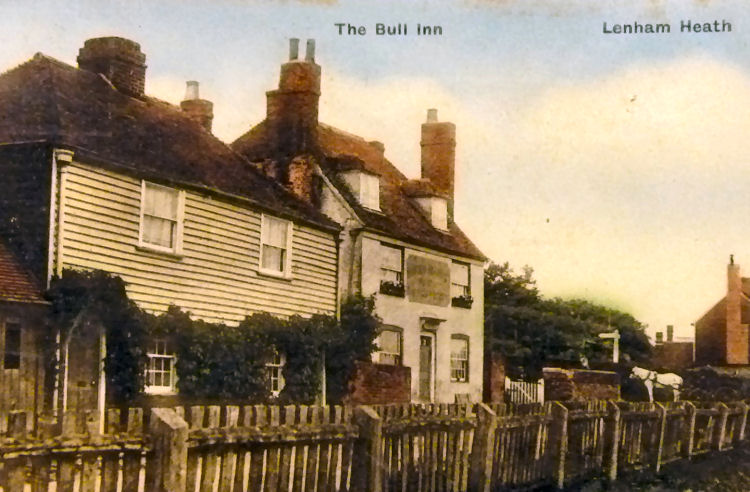
Above postcard, circa 1900, kindly sent by Allan Ward. |
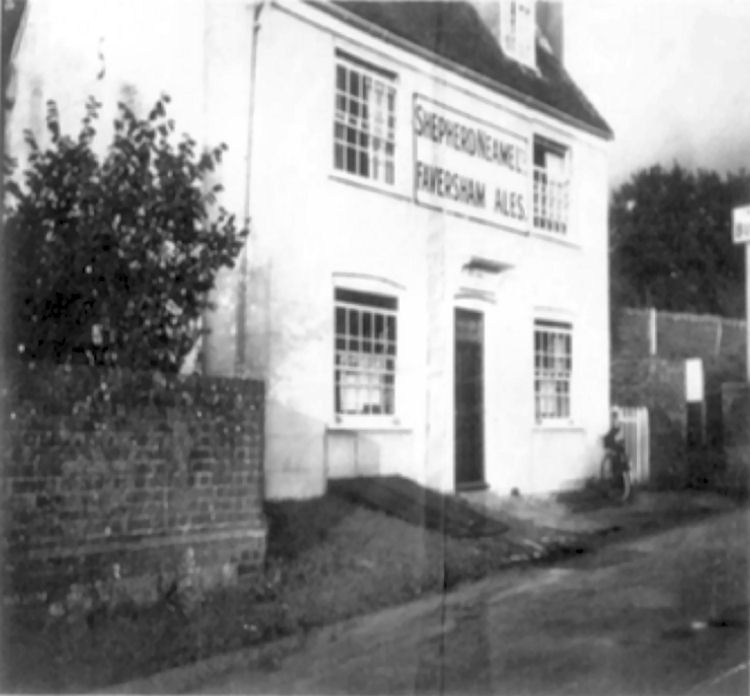
Above photo, date unknown, supplied by the
Lenham History Society. |
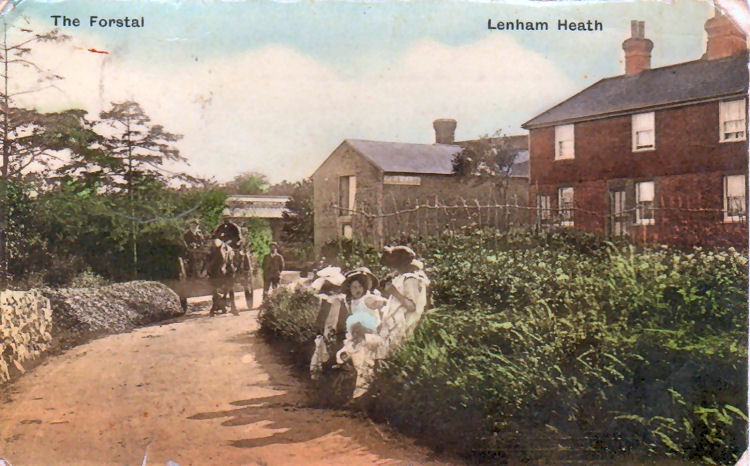
Above postcard, 1919, kindly sent by Rory Kehoe. The sign on the central
building says Ashford breweries and shows the buildings of the Chapman
Brewery later the Lion Brewery. |
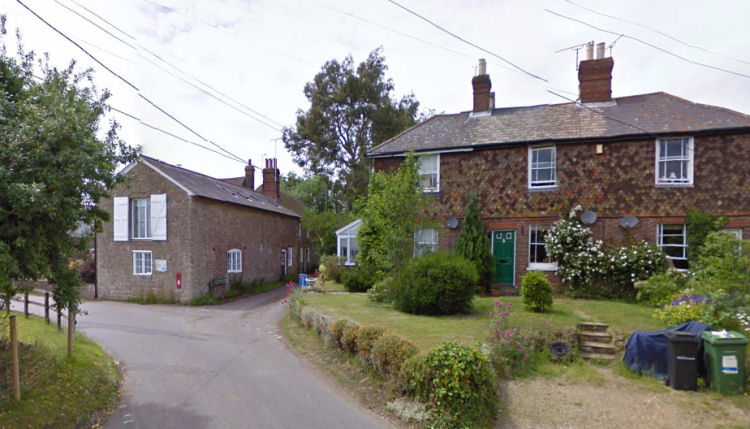
Above Google image, May 2010 of former Brewery buildings |
|
From the Kentish Gazette, 15 November 1842.
Shocking Accident.
On Wednesday, the 2nd instant an inquest was held before J. Hinde. esq.,
coroner at the "Bull," Lenham-heath, on the body of Edward Bramwell a
lad in the employ of Mr. William Chapman, of Lenham, farmer, who came by
his death in the following shocking manner.
W. Ransley deposed that he was bailiff to Mr. Chapman; on Saturday last
he and deceased were at plough on Mr. Chapman's farm, with a one-horse
plough when on turning a corner the horse suddenly took fright and ran
away for twenty or thirty rods; witness and the deceased did all they
could to stop the horse, and the deceased in his endeavours to do so,
was thrown down, and became entangled in the plough; the horse was a
very quiet one, and he could not account for his taking fright.
W. Boorman deposed that he was a labourer residing at Lenham; he saw the
horse running away; got over the hedge and succeeded in stopping it, and
found the deceased entangled in the plough; he took him out, and finding
he was much hurt carried him home to his father's house, and the first
witness immediately went for a surgeon; the deceased died the following
Monday morning.
Charles Wilks deposed that he was a surgeon at Charing; about twelve
o'clock on last Saturday he was requested to attend the deceased; he did
so and on examining him he found he was very faint and had a severe
lacerated wound on the upper part of the left thigh; dressed the wound
and ordered the deceased some wine; was of opinion that the deceased had
died from the injuries he had received.
Verdict, "That the deceased was accidentally Killed by a horse running
away."
|
|
Whitstable Times and Herne Bay Herald, 8 January 1870.
At the petty sessions on Tuesday, before H. B. Walker. G. E. Sayer, and
W. D. Walker, Esqrs., and Sir E. Knatchbull, Bart., a charge of assault
against six young men, belonging to Egerton, occupied the attention of
the Court for an unusual length of time. The names of the defendants
were Robert White, William Bolton, Frederick Maxted, John Russell, James
Vane and William Burton. The prosecutor was an elderly man named Richard
Stroud, in the employ of W. B. Foster, Esq., of Egerton. Mr. Langham,
solicitor, appeared for the prosecution, and Mr. Till for the defence.
It appeared that on the evening of December 24th, Stroud went into the
"Bull," at Lenham Heath, and remained there till nearly twelve o'clock.
As he was coming out he was set upon by the defendants, who knocked his
hat off, hustled him, and spat upon him. Burton kicked him, but not
severely, and White knocked his hat off. Complainant went home and about
two o'clock in the morning, White, Bolton, Maxted, and Vane, came up to
his cottage and threw brickbats at the door, threw his gate off its
hinges, and White was pulling down the palings of his pig sty to let his
pig out, when complainant, who with his son had been watching to protect
his premises, having expected that the defendants when they left the
public house would molest him, came and collared him. Burton and Russell
then came up, and they abused the complainant and shook their fists in
his face. The cause of their animosity was said to be that the
complainant had given evidence which had led to Burton being convicted
of robbing Mr. Foster. For the defence witnesses were called who denied
in toto everything alleged by the complainant and his witnesses, and
said no disturbance took place in the public house at all.
The Bench fined Burton, Russell, and White, £1 each, and dismissed the
charge as against the other defendants.
|
|
From the Maidstone Journal and Kentish Advertiser, Thursday 10 September 1896.
BEARSTEAD BREWSTER SESSIONS.
The superintendents report.
Superintendent Johnson presented his report on the licensed houses of
the division. This showed that during the past year 3 licence holders
have been convicted of offences against their licences, viz., Edward
Collins, landlord of the "Bull," Lenham Heath; Alfred Walden, landlord
of the "Greyhound" beer house, Wychling; and Alfred Roberts, landlord of
the "Pig and Whistle," Boughton Malherbe.
In the last case the licence had since been transferred.
|
|
From the Maidstone Journal and Kentish Advertiser, Thursday 10 September 1896.
Drunk.
Samuel Burbridge was charged with being drunk on licensed premises on
the 3rd of April, at the "Bull Inn," Lenham Heath.
I.C. Hubbard prove the facts. He said that defendant was one of a party
of five men who were found drunk on the "Bull" premises on Good Friday.
The other men were convicted, but defendant absconded.
The Bench convicted, and imposed a fine of 5s. 12s. 4d. costs, or in
default 7 days' hard labour.
|
|
From the the
Lenham History Society accessed September 2020.
BULL HILL. By Henny Shotter.
The chicken and egg question:
If you are a relative newcomer to Lenham or Lenham Heath you might
have wondered (as I did) where the name ‘Bull Hill’ comes from. Some of
the ‘real’ locals might remember the Bull Inn. Did the road get its name
from the pub or the pub its name from the road?
The research which we were able to carry out so far indicates that
neither is true, and the road and the former inn got their name
from....the bulls!
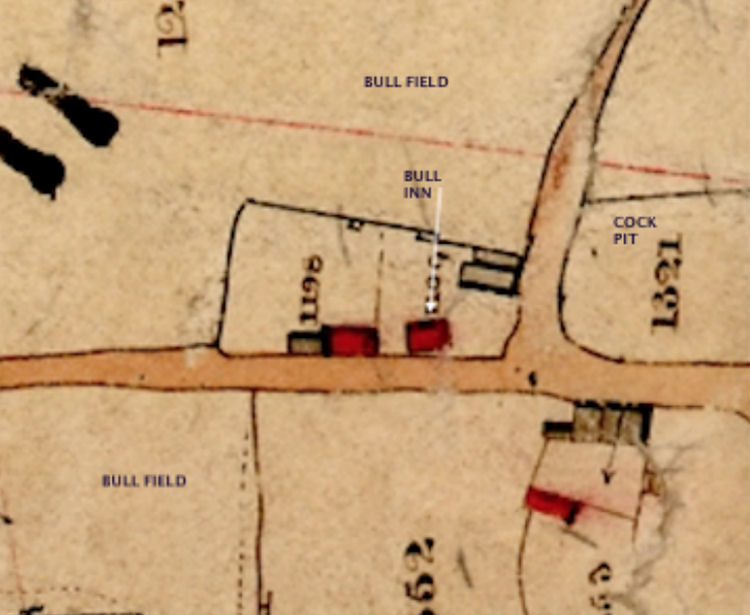
The Tithe map of 1839 (Copyright
from the Kent Archives) shows several fields with the name of ‘Bull
Field’. You might think that these fields were part of the land
belonging to the Bull Inn. This could have been true before 1839, but
the Tithe Schedule of 1839 shows these fields being owned by various
owners.
Bullies:
Bulls have to be kept in their own field away
from the cows in their enclosure as they are
known to be ‘bullies’. They were prized
animals, not only for the quality of the herd
of cattle but also for bull baiting. Bull
baiting was a popular animal blood sport in
the 16th and 17th century as was bear baiting, a tradition to which
another Shepherd Neame
pub in Lenham, ‘The Dog and Bear’, bears witness. There is by the way a
‘Bear Field’ on the
Lenham Tithe Map. Bears were more expensive and difficult to come by, so
bull baiting was
more widespread.
Not far from Bull Hill, the former Bull Inn and the Bull Fields is
another field which in the
Tithe map of 1839 carries a name connected to the popularity of animal
blood sports. There is
little doubt that a field with the name ‘cockpit’ was an enclosure used
for cock fighting. So,
even if it is guess work, it doesn’t seem too far-fetched to conclude
that the name ‘The Bull’
has a connection to bullbaiting.
Early Records.
The earliest record which we have so far of the
Bull Inn is the Tithe Schedule. The then owner
was Henry Shepherd (of Shepherd Neame
brewery), the landlord was a Thomas Collins.
According to the Tithe Schedule, Henry Shepherd
also owned the "Chequers Inn" (in Lenham Square)
which the Shepherd Family had bought in 1771. If
they bought ‘The Bull’ at around the same time
(we will hopefully find
out), then the ale house in Lenham Heath was in operation at the same
time as the Lenham
Heath Military Camp and of course the history of the Bull Inn (not
necessarily the same
building) can go back much further.
The mystery of the cannon.
The proximity to the George III camp on Camp Field in Lenham Heath would
explain why a
cannon stood in front of the pub, a fact, which most former visitors to
the pub have
forgotten. When asked their reaction normally is: ‘Yes, now that you
mention it, you are
right. There was a cannon.’ It is very unlikely that the canon came from
6th Guards Tank
Brigade workshop which was also in Lenham Heath in WWII as the workshop
repaired
tanks.
The question is: where did the cannon come from and where has it gone?
Life in Lenham Heath in the early 20th century.
Some years ago, former Lenham Heath resident Sidney John Tappenden who
was then 76
produced a map which gives us a good insight in the farming community of
Lenham Heath in
the early 20th century. He records many orchards, apple and cherry
orchards. He also notes
that ‘most holdings kept 1 horse, chicken, ducks, geese, Guinea Fowl and
a few sheep and a
pig’. Among the merchants in Lenham Heath he recalls is George Chapman,
a carrier and
coal merchant, who ‘collected morellas in the evening and took them to
Maidstone. They
were picked in Peck baskets. Most of the heath had a few trees, even in
the hedges.’ Other
merchants which Sidney John Tappenden mentions, are: Bignaal, the
grocer, Fred Chesson
for cloths and provisions, Coveney, the butcher, Tappenden the butcher
and owner of the
slaughterhouse and H. Tappenden, the egg packer and Ernest Chapman who
operated a
repair shop for steam engines, threshing machines and lorries.
‘Cosy’ and memorable.
Local residents recollect that the Bull Inn was very small inside. It
was in those days,
together with the "Harrow Inn," supposedly the smallest ale house in Lenham and often full
when the men, returning from working on the land, took a small detour to
the Bull in Lenham
Heath.
The Maidstone Journal and Kentish Advertiser from September 10th 1896
reported that a
Samuel Burbridge was charged and convicted for being drunk at the ‘Bull
Inn’. The
punishment was hard: a 5 shilling fine, in addition to 12 shilling 4
pennies cost or 7 days hard
labour.
Fortunately, by the 20th century such practices had ceased and those
Lenham residents who
remember the bell for last orders at the Bull Inn hopefully do this
without regret. |
LICENSEE LIST
COLLINS Thomas 1841+ (age 31 in 1841 ) )
MOORE J 1855+
WALKER A 1857+
WAKEFIELD Richard 1858-61+ (also blacksmith age 46 in 1861 ) )
WALKER Alfred 1891+ (age 60 in 1891 ) )
COLLINS Edward 1901-03+ (age 63 in 1901 ) )

WOOLEY John 1913-22+
https://pubwiki.co.uk/Bull.shtml
 Census Census
 From the Kelly's Directory 1903 From the Kelly's Directory 1903
|




